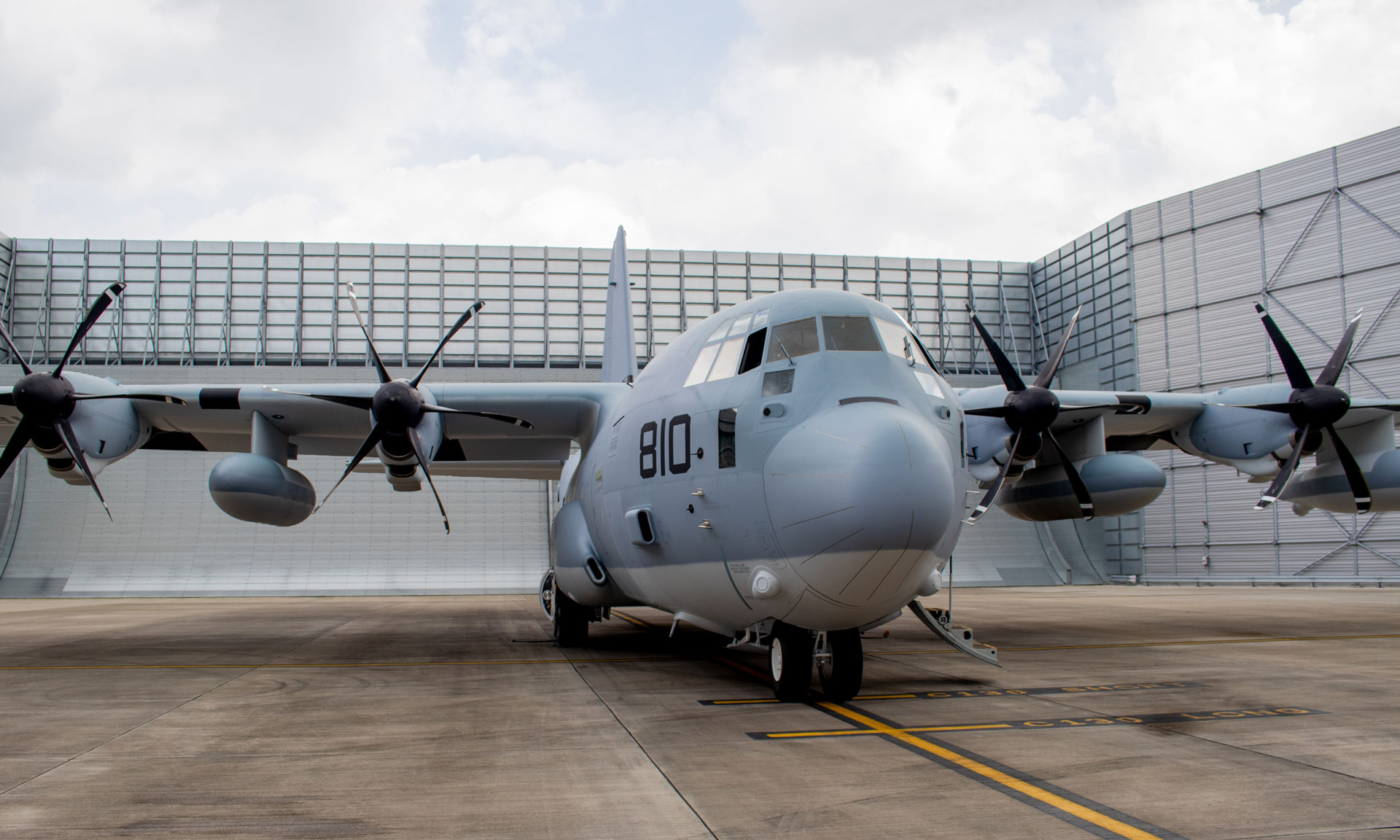
How Marshall is delivering for the United States Marine Corps
In 2020, Marshall was awarded a ten-year contract to provide maintenance for the fleet of KC-130J aircraft operated by the United States Marine Corps (USMC) outside the continental United States.
The contract was one of the biggest in the company’s history and rapidly opened the door for scheduled and unscheduled maintenance, repair and overhaul (MRO) work on one of the world’s largest C-130 fleets.
Since then, Marshall has steadily grown and sustained its strong relationship with the USMC by providing an unmatched level of quality, efficiency and reliability.
Marshall and the USMC: by the numbers
As of July 2025, Marshall has:
- worked on 42 different USMC aircraft
- spent at least 420,000 hours working on USMC aircraft alone
- completed 37 minor depot inspections (or equivalent)
- performed 15 phase maintenance intervals
- serviced aircraft representing 6 USMC squadrons
- produced 1,500+ parts for 25 USMC aircraft since 2021
- replaced 5 sloping longerons and 4 rainbow fittings
- worked on aircraft ranging from 1 to 25 years old
A relationship takes flight: 2019-2021
July 2019
Marshall wins a support contract for a new “Fat Albert” C-130J Super Hercules aircraft to be operated by the Blue Angels, a flight demonstration squadron showcasing the teamwork and professionalism of the United States Navy and Marine Corps.August 2020
Marshall delivers Fat Albert to a USMC crew following depth maintenance, minor modifications and a full repaint in the Blue Angels livery. Since then, the aircraft has taken part in many flying performances, while also providing crucial support by transporting tools, spare parts and engineers.October 2020
Following a rigorous international competition including extensive pre-solicitation audits and demonstration of past performance, Marshall wins a ten-year multi-million dollar contract to provide depot-level maintenance for the US Marine Corps’ fleet of KC-130J tanker aircraft deployed outside the continental U.S.December 2020
The first USMC aircraft (BuNo 165810) arrives at Marshall for planned maintenance interval (PMI) work under the new contract.July 2021
Having completed maintenance, Marshall delivers the aircraft to VMGR-252, the oldest continually active squadron in the USMC.No job too big or small
The majority of USMC inputs arriving at Marshall fall into two categories: minor depot inspections (MDIs) and planned maintenance intervals (PMIs).
MDIs are generally quick checks that last roughly a month, barring the discovery of emergent work needing further attention.
By contrast, PMIs involve depth maintenance, including stripping off engines and other ancillaries to thoroughly inspect the frame and key systems, followed by a full repaint - frequently resulting in an aircraft being taken out of action for more than four months.
In addition to a steady flow of MDIs, the USMC has increasingly entrusted PMI work to Marshall, having turnaround times to be reliably shorter than industry averages while also meeting or exceeding expected quality levels. The ability to return an aircraft to service even a week earlier than expected is enormously valuable for an operator like the USMC, as it means downtime is minimised and the fleet can remain at full strength for as long as possible.
Additionally, certain PMI checks may lead to especially complex repairs; one notable example involved fabricating new parts to fix extensive fire damage - a capability very few MRO businesses are able to undertake. Between 2020 and 2024, Marshall has manufactured nearly 900 parts in-house for USMC aircraft alone.
"Marshall managers have a keen ability to quickly adjust production plans and schedules and contain a broad range of risks to deliver on time to contract delivery dates.
"They routinely and enthusiastically handled a multitude of issues, successfully maintaining constant surge capacity operations by executing scheduled inputs alongside short notice customer service and ISR work request aircraft.”
U.S. Marine Corps Contractor Performance Assessment Report
NAVSUP Fleet Logistics Center Yokosuka
In part, this degree of success has been made possible by Marshall’s improvements to its facilities and processes. In 2020, the company thoroughly renovated its dedicated hangar for servicing United States aircraft, unlocking new efficiencies and implementing a range of continuous improvement practices.
This level of performance was further validated through the USMC Contractor Performance Assessment Report (CPAR) covering the February 2024 - January 2025 period, in which Marshall received “Exceptional” ratings in the categories of Schedule and Supply, and “Very Good” ratings for Quality, Cost Control, Management and Engineering.
Additionally, in early 2024 Marshall’s USMC teams and facilities were comprehensively audited by the Defense Contract Management Agency (DCMA), the supervisory body that oversees the US government’s contracts with companies such as Marshall.
“There are very few facilities that can conduct this type of service. Partnering with Marshall allows us to increase maintenance throughput, and it is pretty easy for us to fly the aircraft there.
“Marshall has been a fantastic partner for us. They are responsive, professional and take very good care of our aircraft.”
Lt Col Mark “Lurch” Bock
The next chapter: a long-term presence in the United States
Building on the success of its USMC work in the UK, Marshall is progressing with construction of a purpose-built C-130 Hercules MRO and engineering facility in North Carolina.
The 192,000 sq ft facility, which is scheduled to start operations in 2025, will comprise a six bay hangar with an additional seventh paint bay.
The platform expertise and exacting standards from Marshall’s UK operations will carry over seamlessly into this new high-capacity presence within the continental United States, supporting the U.S. warfighter by keeping aircraft fleets mission-ready at all times.
“Our Cambridge and Greensboro operations may be thousands of miles apart, but they will share a common commitment to providing mission-critical support for our customers, and I am certain the MRO technical knowledge, expertise and capabilities we have cultivated in the UK will grow and flourish in North Carolina’s thriving aerospace ecosystem.”
Chris Dare
MRO Support Services Director, Marshall
Find out more about our new facility in Greensboro, North Carolina
